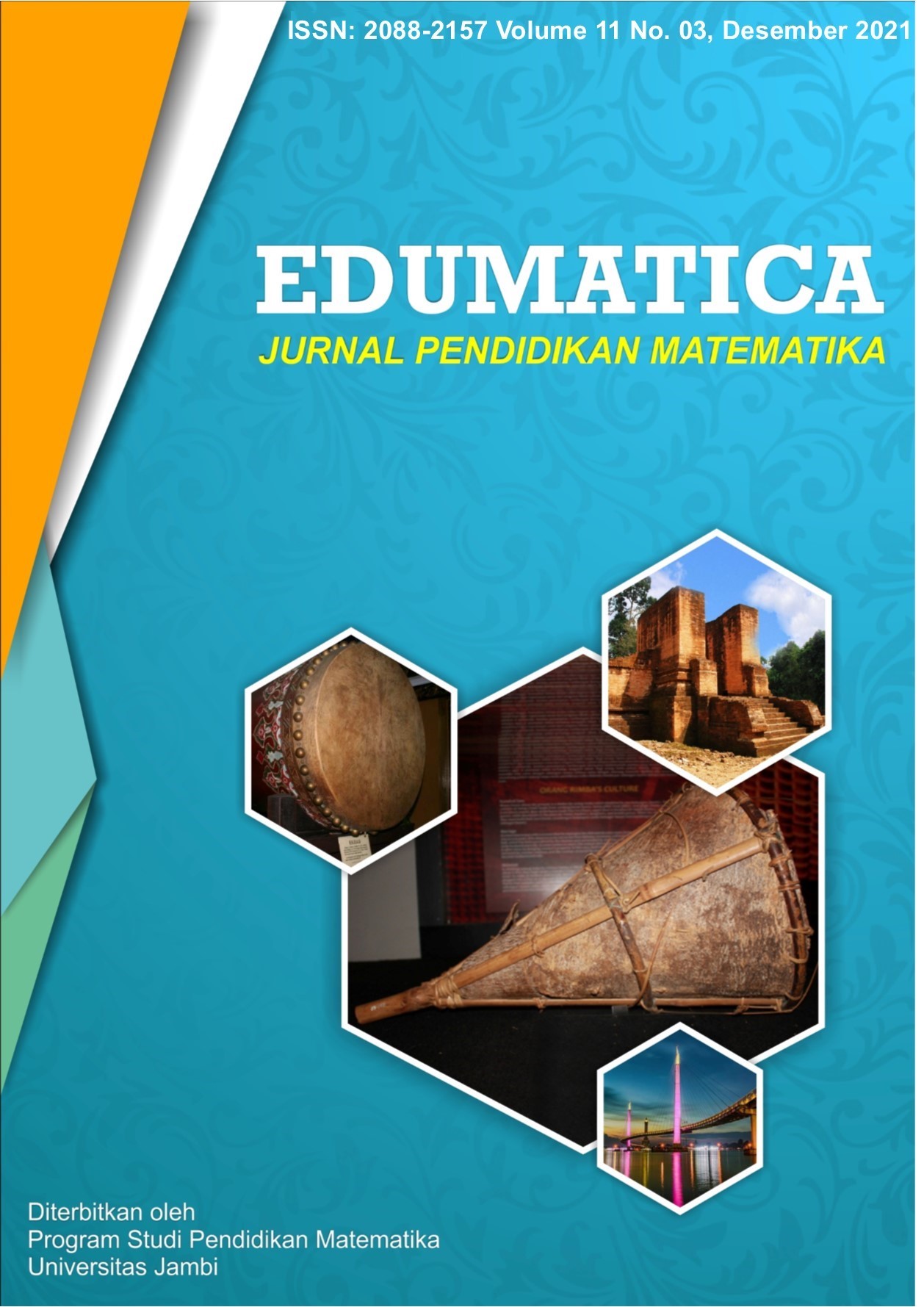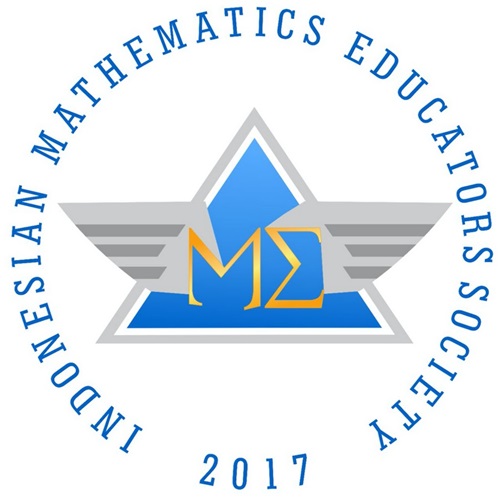Use of Problem Based Learning (PBL) Models to Improve Student Learning Outcomes
DOI:
https://doi.org/10.22437/edumatica.v11i03.12863Keywords:
problem based learning (PBL), three-variable linear equation system (TVLES)Abstract
The ability of students to understand the material on the Three Variable Linear Equation System (SPLTV) is still an important problem that must be solved. Teachers as educators need to use various learning models to improve student learning outcomes. This study aims to determine the increase in student learning outcomes of class X SMAN 6 Ambon who are taught using the Problem Based Learning (PBL) model on SPLTV material. The type of research used is classroom action research (CAR) which consists of 2 cycles and each cycle consists of 2 meetings. The data sources are teachers and students of class X-IPA1 SMAN 6 Ambon in the 2019/2020 academic year while the research subjects are 25 students. The research instrument used is the SPLTV learning outcome test which has been validated by experts. To collect data, researchers used test and observation techniques. The results showed that there was an increase in student learning outcomes. In the first cycle, only 13 students completed (44%) but in the second cycle the number of students who completed increased to 19 students (76%). Based on the completeness in cycle I and cycle II, there was an increase from cycle I to cycle II by 32%.
Downloads
References
Arikunto, S., Suhardjono, & Supardi. (2006). Peneilitian Tindakan Kelas. Jakarta: Bina Aksara.
Assegaff, A., & Sontani, U. T. (2016). Upaya Meningkatkan Kemampuan Berfikir Analitis melalui Model Problem Based Learning (PBL). Jurnal Pendidikan Manajemen Perkantoran, 1(1), 38. https://doi.org/10.17509/jpm.v1i1.3263
Faqiroh, B. Z. (2020). Problem Based Learning Model for Junior High School in Indonesia (2010-2019). Indonesian Journal of Curriculum and Educational Technology Studies, 8(1), 42-48. https://doi.org/10.15294/ijcets.v8i1.38264
Fuadi, R., Johar, R., & Munzir, S. (2016). Peningkatkan Kemampuan Pemahaman dan Penalaran Matematis melalui Pendekatan Kontekstual. Jurnal Didaktik Matematika, 3(1), 47-54. https://doi.org/10.24815/jdm.v3i1.4305
Laamena, C. M. (2019). Strategi Scaffolding Berdasarkan Gaya Belajar dan Argumentasi Siswa: Studi Kasus pada Pembelajaran Pola Bilangan. BAREKENG: Jurnal Ilmu Matematika Dan Terapan, 13(2), 085-092. https://doi.org/10.30598/barekengvol13iss2pp085-092ar809
Laamena, C. M., Mataheru, W., & Hukom, F. F. (2021). Perbedaan Hasil Belajar Siswa Kelas VIII SMP Menggunakan Model Problem Based Learning (PBL) berbantuan Aplikasi Swishmax dan Model Pembelajaran Konvensional pada Materi Prisma dan Limas. BAREKENG: Jurnal Ilmu Matematika Dan Terapan, 15(1), 029-036. https://doi.org/10.30598/barekengvol15iss1pp029-036
Maryati, I. (2018). Penerapan Model Pembelajaran Berbasis Masalah pada Materi Pola Bilangan di Kelas VII Sekolah Menengah Pertama. Mosharafa: Jurnal Pendidikan Matematika, 7(1), 63-74. https://doi.org/10.31980/mosharafa.v7i1.342
Nafiah, Y. N., & Suyanto, W. (2014). Penerapan Model Problem-based Learning untuk Meningkatkan Keterampilan Berpikir Kritis dan Hasil Belajar Siswa. Jurnal Pendidikan Vokasi, 4(1), 125-143. https://doi.org/10.21831/jpv.v4i1.2540
Purwanto, N. (2009). Evaluasi Hasil Belajar. Yogyakarta: Pustaka pelajar.
Ratumanan, T. G., & Matitaputty, C. (2017). Belajar dan Pembelajaran Matematika. Bandung: Alfabeta.
S. Nasution. (2015). Didaktik Asas-asas Mengajar (6th ed.). JAKARTA: Bumi Aksara.
Shofiyah, N., & Wulandari, F. E. (2018). Model Problem Based Learning (PBL) dalam Melatih Scientific Reasoning Siswa. Jurnal Penelitian Pendidikan IPA, 3(1), 33. https://doi.org/10.26740/jppipa.v3n1.p33-38
Sugiyono. (2011). Metode Penelitian Pendidikan. Bandung: Alfabeta.
Sulistiani, I. R. (2016). Pembelajaran Matematika Materi Perkalian dengan Menggunakan Media Benda Konkret (Manik-manik dan Sedotan) untuk Meningkatkan Hasil Belajar. VICRATINA : Jurnal Kependidikan Dan Keislaman, 10(2), 22-23. Retrieved from http://www.riset.unisma.ac.id/index.php/fai/article/view/166/169
Yesaya, M. C., Mataheru, W., & Laamena, C. M. (2021). Cognitive Proficiency Analysis of Adventist High School Students Tenth-grade Aliciously Solve Linear Equations System of Two Variables Reviewed of Gender. Proceedings of the 1st International Conference on Mathematics and Mathematics Education (ICMMEd 2020), 550(Icmmed 2020), 457-461. https://doi.org/10.2991/assehr.k.210508.104
Downloads
Published
How to Cite
Issue
Section
License
Copyright (c) 2021 Patresya Nova Mainake, Christina M. Laamena, Magy Gaspersz

This work is licensed under a Creative Commons Attribution-NonCommercial-ShareAlike 4.0 International License.







